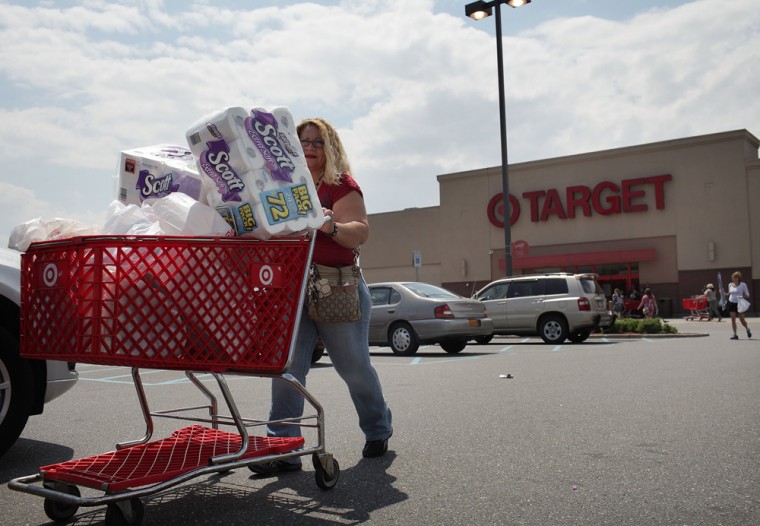Retail workers at a Target in Valley Stream, N.Y., late Friday rejected efforts to make their store the first of the chain's 1,750 to be unionized.
A company spokeswoman said early Saturday morning that 137 workers had voted against joining the union, the United Food and Commercial Workers, while 85 workers voted for it, .
Union President Bruce W. Both said in a prepared statement that the Long Island store workers endured a "campaign of threats, intimidation and illegal acts by Target management," and that the union would contest the results.
"Target did everything they could to deny these workers a chance at the American dream," he said. "However, the workers’ pursuit of a better life and the ability to house and feed their families is proving more powerful. These workers are not backing down from this fight. They are demanding another election. They are demanding a fair election. They are demanding justice and they are prepared to fight for it."
Target spokeswoman Molly Snyder denied the union's allegations.
"Target absolutely believes we have followed all the policies and procedures that are outlined by the National Labor Relations Board in a completely lawful manner," Snyder said.
Target earlier said it pays its workers competitively. This was the first union vote Target has faced in two decades.
A unionization vote could have a ripple effect in the U.S. retail industry as the economy recovers from the worst recession since the 1930s. At a time when jobs are scarce, the retail industry is expected to be one of the strongest sectors for job growth during this decade. But the hours and pay for jobs selling clothes, computers and other goods have been declining in recent years. At the same time, the industry has faced decreasing union membership, which can limit workers' ability to fight for better wages.
Chris Tilly, who directs the UCLA Institute for Research on Labor and Employment, said a win for the union would have been significant.
"It would not be the end of the story," he says. "They're testing the waters."
Since two-dozen workers from the Valley Stream store approached the union with their grievances regarding hours and pay in February, Target employees from around the country have been reaching out to the labor organization, according to Patrick Purcell, spokesman for the United Food & Commercial Workers Local 1500. The UFCW consists of mostly grocery workers, but also represents employees at retailers that include clothier H&M.
"We're looking at the beginning of a national movement in Target stores," he said. "This is just the first step."
Target took steps of its own. The Minneapolis-based retailer had representatives going door to door in Valley Stream, distributing flyers to educate workers on the downside of unionization and called meetings with workers to answer questions. In a handout addressing whether the company would shut down the Valley Stream store if workers unionize, Target said: "There are no guarantees."
Target spokeswoman Molly Snyder said the retailer seeks to create a workplace in which employees don't need union representation. "Target believes in solving issues and concerns by working together," she said.
Shrinking hours
The vote came as union membership in the retail industry has waned. In 1983, 1.2 million retail workers were union members. Today, that number is 703,000, with more than half of those workers in grocery stores, according to the Retail, Wholesale and Department Store Union.
At the same time, the quality of retail jobs has fallen. The median hourly wage for retail salespeople has dropped 3 percent since 2006 after adjusting for inflation. And shrinking hours for many workers make it hard to earn a living wage or qualify for benefits.
"Workers are seeing their hours getting cut and their take-home pay, while basic costs for gas and food are soaring," says Burt Flickinger III, president of retail consultancy Strategic Resource Group. "They're increasingly frustrated."
Workers at the store in Valley Stream are upset about hourly wage increases amounting to eight cents or less, said Purcell, the union spokesman. Some employees also said their hours had been cut from 30 per week to fewer than 10. Part-timers must bank at least 20 hours a week, on average, to qualify for benefits. A Target spokeswoman says hourly workers at the Valley Stream store average 24 hours a week.
Charmain Brown, who's worked at Target for six years, supported the effort to organize. "I feel like if we get a union it would be better because we'd have a voice, somebody to stand up for us," he said.
Betsy Wilson, a single mom of two who works about 21 hours a week at Target, disagreed. "What do I need a union to fight for me for?" she said.
Other retail workers also are putting up a fight. A new group called the Organization United for Respect at Wal-Mart, partly funded by the UFCW, coordinated a small protest at the company's Bentonville, Ark., headquarters Thursday. And a union representing 4,000 Macy's workers in New York, including those at the flagship store, authorized a strike on Monday when the department store tried to get concessions on wages, benefits and hours. A tentative agreement was reached on Thursday.
"We haven't seen such unrest in organized labor (in the retail sector) since the 1970s," Flickinger says.
